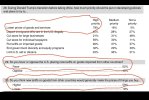Donald Trump had been the president-elect for just two days when he reportedly spoke by phone with Russian President
Vladimir Putin on Nov. 7.
On the call, Trump advised the Russian president not to escalate the war with Ukraine and reminded him of the U.S.’s military presence in Europe, according to an account first published by
The Washington Post, which cited multiple sources familiar with the conversation.
The Kremlin, however, denied that meeting had ever taken place. “Pure fiction,” Kremlin spokesperson Dmitry Peskov insisted.
Normally, the U.S. would be able to document that the call had happened. But not this time.
That's because the State Department, which traditionally helps coordinate phone calls between incoming presidents and world leaders, has been
shut out of Trump’s calls with foreign dignitaries.
That means the conversations were not held over secure phone lines, no State Department staff were available to offer guidance on the nuances on foreign policy and no official interpreters were on hand to overcome language barriers that can sometimes lead to confusion or misunderstandings about exactly what was said.
For U.S. foreign policy analysts, Trump’s calls with Putin and other world leaders after
his victory over Vice President
Kamala Harris in the Nov. 5 election
are cause for alarm.
“We’re entering a dangerous territory of telephone games, where Trump is going to have private chats with foreign leaders, and they're going to tell their teams one thing, and Trump is going to tell our national security team another,” said Brett Bruen, a former diplomat.
Different interpretations of private conversations stemming from translation difficulties or misunderstandings could not only sow confusion, Bruen said, but could trigger an international crisis.
trump doesn't want anyone involved in these calls because its much harder to do things like blackmail and bribe foreign leaders. A phone call with Ukrainian President
Volodymyr Zelenskyy in 2019 deepened Trump’s distrust of government employees. During the call, Trump threatened to withhold U.S. aid to Ukraine unless Zelenskyy investigated then-former Vice President Biden and his son, Hunter Biden. A summary of the conversation, made public by Trump's Justice Department and prepared by a government aide who had been permitted to listen to the call, helped lead to
Trump’s first impeachment.
Trump’s remarks to Putin that he should not escalate the war with Ukraine raised eyebrows because
federal law makes it a crime for an unauthorized American citizen to negotiate a dispute between the United States and a foreign government.
“There can only be one foreign policy at a time,” Bruen said. “What Trump is doing is saying you need to do X or Y, even though he hasn’t been sworn in, even though he doesn’t control U.S. foreign policy right now.”
Russia’s denial that the call ever took place also shows why it’s problematic for Trump to hold private conversations with foreign leaders without the involvement of the State Department, its official interpreters or other support staff, said Fried, who worked under Democratic and Republican administrations and is now a fellow at the Atlantic Council.
“Somebody’s not telling the truth,” he said. “If the Trump people had used the State Department, the Kremlin wouldn’t be able to get away with denying that the call took place, or at least there’d be no doubt.”
Fried said private calls with foreign dignitaries are not always held over secure phone lines because some leaders may not have such lines at their disposal. Still, phone conversations over unsecured lines are risky.
“Most of our adversaries are able to tap into these calls, which in and of itself is concerning because it means that the Russians are spying on the calls he’s having with Europe and the Middle East, and the Chinese are accessing the same ones,” Bruen said. “These are sensitive discussions. They allow countries’ leaders to understand where there may be potential compromises or vulnerabilities.”
When Zelenskyy called Trump at his Mar-a-Lago estate in Florida to congratulate him on his victory, Trump handed the phone over to Elon Musk, the billionaire business titan who has become one his advisers and a ubiquitous presence at his side. Musk, a government contractor, has provided communications services to Ukraine through his Starlink satellite network during its war with Russia.
Musk also met on Nov. 11 with Iran's ambassador to the United States in an effort to help diffuse tensions between the two countries, according to
multiple reports. Iran later
denied that the meeting had taken place.
Allowing Musk to participate in a private call with Zelenskyy is alarming, Bruen said, because “Musk does not have a government role. He doesn’t have a security clearance. He does have a whole of lot of interest in the outcome of what is happening in Ukraine” because of his business interests there.
Worries about Trump’s phone calls with foreign leaders are compounded by questions of how he has handled classified documents in the past, Bruen said.
Trump suggested his Democratic opponent in the 2016 election, Hillary Clinton, should be jailed and disqualified from holding office amid questions about how she handled classified information. Seven years later, after he left office, a federal grand jury in Florida indicted Trump on 40 counts of mishandling classified documents, some of which were stored in a bathroom in Mar-a-Lago.
Given Trump’s past, his unsupervised phone calls with foreign leaders should set off alarms, Bruen said.
“It’s a hot mess,” he said.



